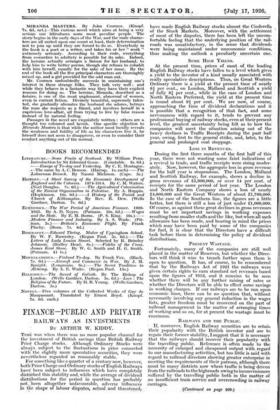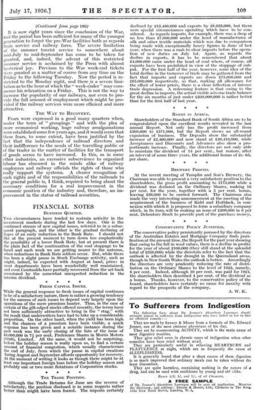FINANCE --PUBLIC AND PRIVATE
TIME was when there was no more popular channel for the- investment of British savings than British Railway Priol. Charge stocks. Although Ordinary Stocks were always subject to the fluctuations in price connected with the slightly more speculative securities, they were nevertheless regarded as reasonably stable. For something like a quarter of a century now, however, both Prior Charge and Ordinary stocks of English Railways have been subject to influences which have completely distUrbed this stability and, while the average of dividend distributions for the period in question has probably not ,i.been altogether unfavourable, adverse influences in die shape of labour disputes, actual and threatened,- have made English Railway stocks almost the Cinderella of the Stock Markets. Moreover, with the settlement of most of the disputes, there has been left the uncom- fortable feeling that the -underlying position of the rail- roads was unsatisfactory, in the sense that dividends were being maintained under uneconomic conditions, thus making the outlook a peculiaily uncertain one.
SOME HIGH YIELDS.
At the present time, pikes of, most of, the- leading English Railway stocks have fallen to a level which gives a yield to the investor of a kind usually associated.with really speculative descriptions. Thus, on Great W.estern Ordinary there is a yield at the present time of nearly 8i per cent., on London, Midland.and Scottish a yield of fully 81 per cent., while in the case, of London and North Eastern Preferred, the yield at the present time is round about 91 per cent. We are now, of course, approaching the time of dividend declarations and it is possible that a recognition of that fact, and some nervousness with- regard to it, tends to prevent any professional buying of railway stocks, even at their present level, the greatest uncertainty -being felt as to how the companies will meet the situation arising out of the heavy declines in Traffic Receipts during the past • half year, owing, first to the general strike, and, later, to the general and prolonged coal stoppage.
Loss IN REVENUES.
During the first three months of the first half of this year, there were not wanting some faint indications of a revival in trade, and traffic receipts were rising moder- ately. Now, however, the aggregate loss in gross revenue for the half year is stupendous. The 'London; Midland and Scottish Railway, for example, shows a decline in gross revenues of £5,300,000, or over 14 per cent. of receipts for the same period of last year. • The London and North Eastern Company shows a loss of nearly £4,000,000 and the Great Western of about £1,760,000. In the case of the Southern line, the figures are a little better, but there is still a loss of just under £1,000,000. Of course, as against these great declines in gross revenues must be set important savings in working expenses resulting from smaller staffs and the like, but when all such allowance has been made, and bearing in mind the prices which may have been paid by some of the companies for fuel, it is clear that the Directors have a difficult -task before them in determining the policy of dividend distributions.
PRESENT WASTAGE.
Fortunately, many of the companies are still well . placed in the matter of Reserves, but whether the Direc- tors will think it wise to trench further upon them is open to question. It has, of course, to be remembered that by the Railways Act of 1921 'the railways were given certain rights to earn standard net revenues based upon the figures of 1918, and it remains to be seen whether there will be any further raising of rates or whether the Directors will be able to effect some savings in working charges. If our railways are to be run upon economic lines, there can be no question that, without necessarily involving any general reduction in the wages lists, greater freedom must be recovered on the part of railroad management in the matter of arranging times of working and so on, for at present the wastage must be enormous.
RAILWAYS AND THE PUBLIC.
• If, moreover, English Railway securities are to retain their popularity with the British investor and are to 'regain their former stability, I suggest that it is necessary that the railways should recover their popularity with the travelling public. Reference is - often made to the .necessity of enlarged and cheapened output with regard to our manufacturing activities, but too little is said with regard to railroad directors shoWing greater enterprise in meeting the requirements of their patrons, although there :must be many districts now where traffic is being driven from the railroads to the highroads owing to inconveniences suffered by the travelling public both in the matter of an insufficient train service and overcrowding in railway carriages.
(Continued on page •109.) (Continued front 1;1-age 106).
It is now eight years since the conclusion of the War, and the period has-been sufficient for many of the younger generation to forget the pre-War facilities both as regards train service and railway fares. The severe limitation of the summer tourist service to somewhere about mid-July to mid-September has come to be taken for granted, and, indeed, the advent of this restricted summer service is acclaimed by the Press with almost hysterical joy. Previous to the War week-end tickets were granted as a matter of course from any time on the Friday to the following Tuesday. Now the period is re- stricted to the Monday night, and there is a severe limi- tation as to the hour at which the " week-ender " may com- mence his relaxation on a Friday. This is not the way to increase the popularity of our railways, nor even to pro- vide the full amount of employment which might be pro- vided if the railway services were more efficient and more attractive.
THE WAY TO RECOVERY.
Fears were expressed in a good many quarters when, under the term of " groupings " and with the plea of more economical working, huge railway amalgamations were established some few years ago, and it would seem that these fears, to some extent, have been justified by the fact that the independence of railroad directors and their indifference to the needs of the travelling public or of the trader in the matter of facilities for the transport of goods seems to have increased. In this, as in some other industries, an excessive subservience to organized labour has obscured in the minds alike of railway employees and railway officials the rights of those who really 'Support the systems. A clearer recognition of such rights and of the responsibilities of the railroads to the general public is, I think, required to bring about the necessary conditions for a real improvement in the economic position of the industry and, therefore, an im- provement in the status of railroad securities.











































 Previous page
Previous page